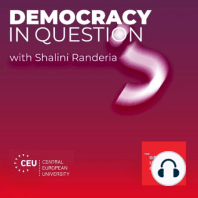25 min listen
Can democracy survive in Hong Kong?
ratings:
Length:
28 minutes
Released:
Jun 30, 2021
Format:
Podcast episode
Description
The pro-democracy movement in Hong Kong is facing its most severe crisis today. The Chinese government has been tightening its grip over the island to stifle political protest, impose restrictions on freedom of press, and hamper free and fair elections. Activists have been fighting for civil liberties and democratic rights, from the Umbrella Revolution of 2014 to the huge anti-extradition law demonstrations in 2020. Jean-Pierre Cabestan (Hong Kong Baptist University) explores the events leading up to the backlash against civic activism, the current state of democracy in Hong Kong and its future prospects.Since the recording of this episode, the Apple Daily has been forced to close. It was the last print news outlet openly critical of the Chinese government.Democracy in Question? is brought to you by:• The Institute for Human Sciences in Vienna: IWM• The Albert Hirschman Centre on Democracy in Geneva: AHCD• The Excellence Chair and Soft Authoritarianism Research Group in Bremen: WOC• The Podcast Company: Earshot StrategiesFollow us on social media!• Institute for Human Sciences in Vienna: @IWM_Vienna• Albert Hirschman Centre on Democracy in Geneva: @AHDCentreSubscribe to the show. If you enjoyed what you listened to, you can support us by leaving a review and sharing our podcast in your networks! BIBLIOGRAPHY• China Tomorrow: Democracy or Dictatorship? (2019).• Hong Kong: The Second Handover (2020). GLOSSARYWhat happened to Apple Daily News?(00:01:30 or p. 1 in the transcript)To learn more about the events leading up to the newspaper’s closure click here. What was the Umbrella Revolution?(00:01:30 or p. 1 in the transcript)On September 26, 2014, Hong Kong students led a strike against the government, demanding change after recent reforms to their election system. The changes would restrict who would be allowed to run for Chief Executive, effectively allowing only pro-China candidates. The protests escalated as time went on, resulting in nearly 100,000 people protesting at any given moment, and nearly two months of student occupation of city centers. Source. What are the Tiananmen Square commemorations?(00:01:30 or p. 2 in the transcript)The 1989 Tiananmen Square massacre was a deadly crackdown by Chinese soldiers on pro-democracy demonstrators in Beijing with estimates of the dead varying from a few hundred to several thousand. Macau and Hong Kong are the only places in China where people can commemorate the anniversary of the massacre. However, in 2020 and now in 2021, authorities in Hong Kong banned an annual vigil for the event, citing the ongoing coronavirus pandemic for the restrictions. The 2021 anniversary was the first since a new controversial security law was approved, aimed at ending the city's pro-democracy movement and criminalizing dissent. Learn more. To learn more about the massacre itself, click here. Who are Deng Xiaoping and Xi Jinping?(00:10:00 or p. 6 and 00:17:15 or p. 11 in the transcript)Deng Xiaoping was a Chinese revolutionary and statesman who served as the paramount leader of the People's Republic of China from December 1978 to November 1989. After Mao Zedong's death in 1976, Deng gradually rose to supreme power and led China through a series of far-reaching market-economy reforms, earning him the reputation as the "Architect of Modern China.”Xi Jinping is a Chinese politician and government official who served as vice president of the People’s Republic of China (2008–13), general secretary of the Chinese Communist Party (2012– ), and president of China (2013– ). Source. Learn more. What is happening in Xinjiang?(00:20:00 or p. 12 in the transcript)The human rights organization Amnesty International recently said that China is committing crimes against humanity in Xinjiang, the north-western region that is home to the Uyghurs and other Muslim minorities. Their report says that China subjects Uyghurs, Kazakhs, and other Muslims to mass detention, surveillance, and torture. Learn more. What was the Ch
Released:
Jun 30, 2021
Format:
Podcast episode
Titles in the series (77)
When and how is power visible in politics? by Democracy in Question?
